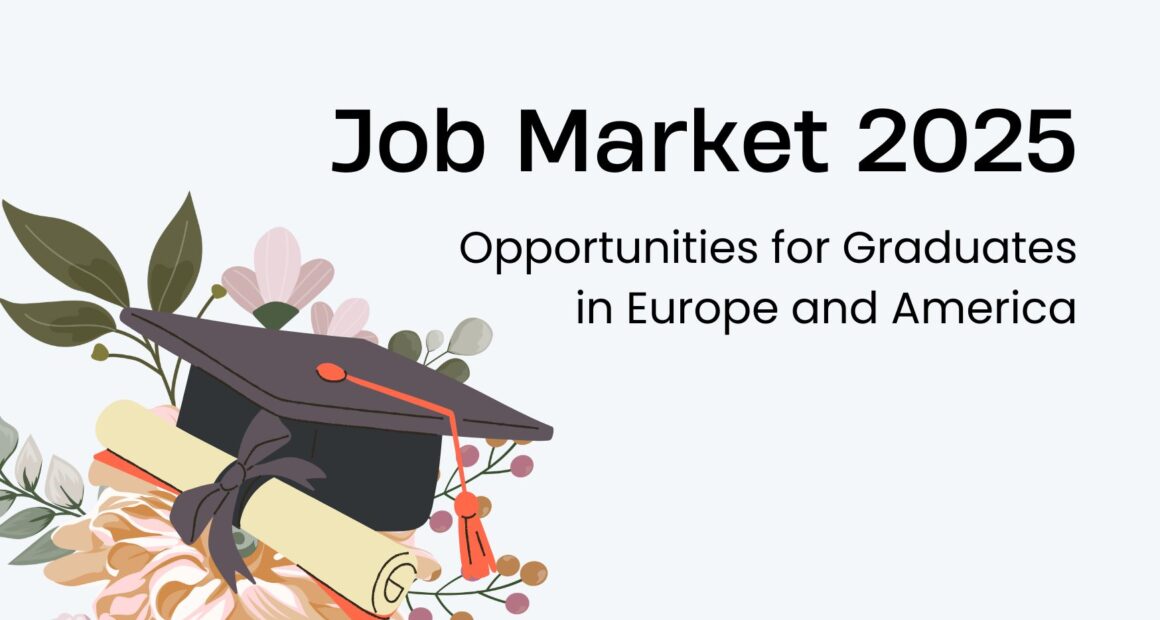As the global economy evolves, the job market for 2025 is poised to present unique opportunities and challenges for recent graduates in Europe and America. With advancements in technology, shifting economic priorities, and the impact of sustainability initiatives, new roles are emerging, while traditional industries adapt to a changing landscape.
In-Demand Fields for 2025
- Technology and Innovation The tech sector remains a cornerstone of job creation, with high demand for graduates in software development, cybersecurity, artificial intelligence (AI), and data analytics. Europe’s push for digital sovereignty and America’s leading position in tech innovation mean abundant opportunities in these fields. Startups and established firms alike seek skilled professionals to drive innovation in areas like quantum computing, blockchain, and machine learning.
- Green Jobs and Sustainability Sustainability is reshaping industries across the board. Graduates specializing in renewable energy, environmental sciences, and sustainable engineering will find opportunities in sectors committed to achieving carbon neutrality. In Europe, the Green Deal initiatives aim to create millions of green jobs, while in America, similar policies under the Inflation Reduction Act support renewable energy projects and sustainable infrastructure.
- Healthcare and Biotechnology The healthcare sector—already accelerated by the COVID-19 pandemic—continues to grow. Graduates in biotechnology, pharmaceutical sciences, and healthcare administration are in demand. Advances in personalized medicine and telehealth services are creating roles that combine medical knowledge with technical expertise.
- Finance and Business Analytics Financial institutions in Europe and America are investing heavily in technology to streamline operations and improve customer experiences. This shift creates demand for graduates skilled in financial technology (fintech), risk management, and business analytics. The rise of digital currencies and blockchain technology also offers new career paths.
- Creative Industries and Digital Media The growing influence of digital media, gaming, and content creation has led to increased demand for graduates in creative fields. From graphic design and animation to marketing and user experience design, industries seek fresh talent to cater to evolving consumer preferences.
Challenges for Graduates
While opportunities abound, graduates must also navigate several challenges:
- Skill Mismatch: Employers are increasingly prioritizing specialized skills over general degrees, pushing graduates to seek additional certifications and training.
- Competitive Market: The post-pandemic recovery has intensified competition for entry-level roles, especially in high-demand sectors.
- Remote Work Adaptation: Graduates need to adapt to hybrid or fully remote work environments, requiring strong self-management and digital communication skills.
Regional Highlights
- Europe: Europe’s emphasis on sustainability and digital transformation is reflected in its job market. Countries like Germany and the Netherlands are hubs for green energy and engineering, while Ireland and Estonia lead in tech innovation.
- America: The U.S. continues to dominate in technology and innovation, offering roles in Silicon Valley and other tech hubs. Meanwhile, industries like healthcare and renewable energy are thriving, supported by government incentives.
Tips for Graduates
- Upskill Continuously: Pursue certifications and online courses in emerging fields like AI, renewable energy, or data analysis.
- Leverage Internships: Gaining practical experience through internships can significantly enhance employability.
- Focus on Soft Skills: Communication, teamwork, and adaptability are critical in a competitive job market.
- Network Strategically: Attend industry events, connect with professionals on platforms like LinkedIn, and join relevant associations.
The Outlook
The job market for graduates in 2025 reflects a blend of traditional roles adapting to modern challenges and entirely new careers emerging from technological and environmental shifts. With strategic planning and continuous learning, graduates can position themselves for success in this dynamic environment.
Please Wait








